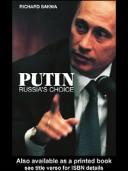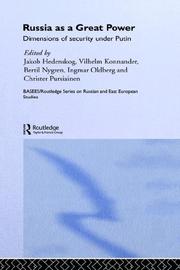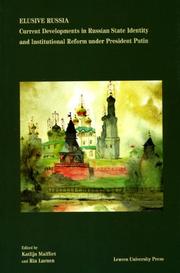| Listing 1 - 10 of 20 | << page >> |
Sort by
|

ISBN: 1134133464 1281062642 9786611062644 0203931939 9780203931936 9780203402078 0203402073 9781134133413 1134133413 9781134133451 1134133456 9781134133468 9780415407656 0415407656 9780415407663 0415407664 9781281062642 6611062645 Year: 2008 Publisher: London : Routledge,
Abstract | Keywords | Export | Availability | Bookmark
 Loading...
Loading...Choose an application
- Reference Manager
- EndNote
- RefWorks (Direct export to RefWorks)
The new edition of this extremely well-received political biography of Vladimir Putin builds on the strengths of the first edition to provide the most detailed and nuanced account of the man, his politics and his profound influence on Russian politics, foreign policy and society. New to this edition: analysis of Putin's second term as Presidentmore biographical information in the light of recent researchdetailed discussion of changes to the policy process and the élites around Putindevelopments in state-society relations including the conflicts with o
Presidents --- Putin, Vladimir Vladimirovich, --- Putin, Wladimir Wladimirowitsch, --- Putin, Volodymyr, --- Pujing, --- Poutine, Vladimir Vladimirovitch, --- Путин, Владимир Владимирович, --- Putinas, Vladimiras, --- Putin, V. V. --- Poetin, Vladimir Vladimirovitsj, --- Russia (Federation) --- Politics and government --- Russie --- Politique et gouvernement
Book
ISBN: 9780826427724 0826427723 1501300563 1441101543 9781441101549 1322085900 9781322085906 9781441106797 1441103325 Year: 2009 Publisher: New York, New York London [England]
Abstract | Keywords | Export | Availability | Bookmark
 Loading...
Loading...Choose an application
- Reference Manager
- EndNote
- RefWorks (Direct export to RefWorks)
"When President Vladimir Putin ascended to the Kremlin at the end of the 1990s, he had to struggle with the after-effects of Boris Yeltsin's political agenda: outrageous corruption, endless social injustice, and deeply entrenched interests dating back to Gorbachev and beyond. From the outset, Putin saw his task as leveling out the political scenery. Discontent had been building up among ordinary Russians on these consequences of the dramatically unstable 1990s. Stabilization of the political system and cleaning up the widespread corruption were Putin's aims, and the Russian people supported him wholeheartedly. Many observers in the West were quick to condemn Putin and depict him as an authoritarian, dishonest leader who was still linked to the KGB. When asked why Russians were supporting the new Kremlin, many experts explained that it was a paradox that combined the country's supposed history of tyranny and its people's inclination towards it. These explanations shaped the West's understanding of modern Russia and they appear to be unshakeable in cultural circles today. Bruno Sergi argues, in this new study, that the way to know the complete story behind how Putin's presidency has been viewed in Russia, is to examine closely the hard realities that conditioned Putin's policies and responses. Misinterpreting Modern Russia: Western Views of Putin and his Presidency looks beyond the stereotypes to the hard logic of the 1990s, and asks a range of provocative questions about the disintegration of the old Soviet empire and the extraordinary riches that have caused so much opportunity and turmoil in recent years."--Bloomsbury Publishing.
Putin, Vladimir Vladimirovich, --- Russia (Federation) --- Politics and government --- Social conditions --- Economic conditions --- Regions & Countries - Europe --- History & Archaeology --- Russia & Former Soviet Republics --- Putin, Wladimir Wladimirowitsch, --- Putin, Volodymyr, --- Pujing, --- Poutine, Vladimir Vladimirovitch, --- Путин, Владимир Владимирович, --- Putinas, Vladimiras, --- Putin, V. V. --- Poetin, Vladimir Vladimirovitsj,

ISBN: 1134239165 1280376910 9786610376919 0203008340 9780203008348 9780415359962 0415359961 6610376913 9781134239160 9781134239115 1134239114 9781134239153 1134239157 9780415651578 0415651573 0415359961 9781280376917 Year: 2005 Publisher: London New York Routledge
Abstract | Keywords | Export | Availability | Bookmark
 Loading...
Loading...Choose an application
- Reference Manager
- EndNote
- RefWorks (Direct export to RefWorks)
After a period of relative weakness and isolation during most of the 1990s, Russia is again appearing as a major security player in world politics. This book provides a comprehensive assessment of Russia's current security situation, addressing such questions as: What kind of player is Russia in the field of security?What is the essence of its security policy?What are the sources, capabilities and priorities of its security policy?What are the prospects for the future?One important conclusion to emerge is that, while Russian foreign policy
National security --- Putin, Vladimir Vladimirovich, --- Putin, Wladimir Wladimirowitsch, --- Putin, Volodymyr, --- Pujing, --- Poutine, Vladimir Vladimirovitch, --- Путин, Владимир Владимирович, --- Putinas, Vladimiras, --- Putin, V. V. --- Poetin, Vladimir Vladimirovitsj, --- Russia (Federation) --- Foreign relations. --- Politics and government --- Foreign relations --- National security - Russia (Federation) --- Putin, Vladimir Vladimirovich, - 1952 --- -Russia (Federation) - Foreign relations --- Russia (Federation) - Politics and government - 1991 --- -National security
Book
ISBN: 1299483445 0300185251 9780300185256 9781299483446 9780300181210 0300181213 9780300205220 0300205228 Year: 2013 Publisher: New Haven Yale University Press
Abstract | Keywords | Export | Availability | Bookmark
 Loading...
Loading...Choose an application
- Reference Manager
- EndNote
- RefWorks (Direct export to RefWorks)
From Kaliningrad on the Baltic to the Russian Far East, journalist Ben Judah has travelled throughout Russia and the former Soviet republics, conducting extensive interviews with President Vladimir Putin's friends, foes, and colleagues, government officials, business tycoons, mobsters, and ordinary Russian citizens. Fragile Empire is the fruit of Judah's thorough research: a probing assessment of Putin's rise to power and what it has meant for Russia and her people. Despite a propaganda program intent on maintaining the cliché of stability, Putin's regime was suddenly confronted in December 2011 by a highly public protest movement that told a different side of the story. Judah argues that Putinism has brought economic growth to Russia but also weaker institutions, and this contradiction leads to instability. The author explores both Putin's successes and his failed promises, taking into account the impact of a new middle class and a new generation, the Internet, social activism, and globalization on the president's impending leadership crisis. Can Russia avoid the crisis of Putinism? Judah offers original and up-to-the-minute answers.
Presidents --- Presidency --- Heads of state --- Executive power --- Putin, Vladimir Vladimirovich, --- Putin, Wladimir Wladimirowitsch, --- Putin, Volodymyr, --- Pujing, --- Poutine, Vladimir Vladimirovitch, --- Путин, Владимир Владимирович, --- Putinas, Vladimiras, --- Putin, V. V. --- Poetin, Vladimir Vladimirovitsj, --- Russia (Federation) --- Politics and government --- E-books --- Presidents - Russia (Federation) --- Putin, Vladimir Vladimirovich, - 1952 --- -Russia (Federation) - Politics and government - 1991 --- -Presidents --- -Russia (Federation)
Book
ISBN: 0253017815 9780253017819 9780253017727 0253017726 9780253017796 0253017793 Year: 2015 Publisher: Bloomington : Indiana University Press,
Abstract | Keywords | Export | Availability | Bookmark
 Loading...
Loading...Choose an application
- Reference Manager
- EndNote
- RefWorks (Direct export to RefWorks)
Julie Hemment provides a fresh perspective on the controversial nationalist youth projects that have proliferated in Russia in the Putin era, examining them from the point of view of their participants and offering provocative insights into their origins and significance. The pro-Kremlin organization Nashi (""Ours"") and other state-run initiatives to mobilize Russian youth have been widely reviled in the West, seen as Soviet throwbacks and evidence of Russia's authoritarian turn. By contrast, Hemment's detailed ethnographic analysis finds an astute global awareness and a paradoxical kinship w
Post-communism --- Youth --- Young people --- Young persons --- Youngsters --- Youths --- Age groups --- Life cycle, Human --- Postcommunism --- World politics --- Communism --- Social aspects --- Social conditions --- Government policy --- Political activity --- Putin, Vladimir Vladimirovich, --- Putin, Wladimir Wladimirowitsch, --- Putin, Volodymyr, --- Pujing, --- Poutine, Vladimir Vladimirovitch, --- Путин, Владимир Владимирович, --- Putinas, Vladimiras, --- Putin, V. V. --- Poetin, Vladimir Vladimirovitsj,
Book
ISBN: 1469640686 1469640678 9781469640679 9781469640686 9781469640662 146964066X 9798890853318 Year: 2018 Publisher: Chapel Hill : Baltimore, Md. : University of North Carolina Press, Project MUSE,
Abstract | Keywords | Export | Availability | Bookmark
 Loading...
Loading...Choose an application
- Reference Manager
- EndNote
- RefWorks (Direct export to RefWorks)
When Vladimir Putin first took power in 1999, he was a little-known figure ruling a country that was reeling from a decade and a half of crisis. In the years since, he has reestablished Russia as a great power. How did he do it? What principles have guided Putin's economic policies? What patterns can be discerned? In this new analysis of Putin's Russia, Chris Miller examines its economic policy and the tools Russia's elite have used to achieve its goals. Miller argues that despite Russia's corruption, cronyism, and overdependence on oil as an economic driver, Putin's economic strategy has been surprisingly successful.
Presidents --- Elite (Social sciences) --- Presidency --- Heads of state --- Executive power --- Putin, Vladimir Vladimirovich, --- Russia (Federation) --- Politics and government --- Economic conditions --- Economic policy --- Putin, Wladimir Wladimirowitsch, --- Putin, Volodymyr, --- Pujing, --- Poutine, Vladimir Vladimirovitch, --- Путин, Владимир Владимирович, --- Putinas, Vladimiras, --- Putin, V. V. --- Poetin, Vladimir Vladimirovitsj, --- E-books
Book
ISBN: 1594039984 9781594039980 Year: 2017 Publisher: Encounter Books
Abstract | Keywords | Export | Availability | Bookmark
 Loading...
Loading...Choose an application
- Reference Manager
- EndNote
- RefWorks (Direct export to RefWorks)
In his 2016 book coauthored with Evan Roth Smith, Putin's Master Plan, Doug Schoen warned of the Russian president's grand vision to expand his country's influence around the world, especially in Eastern Europe, while destabilizing the Western alliance and delegitimizing the very principles of free societiesand especially the political model of democracy's exemplar, the United States. Now, in Putin on the March, Schoen brings the story up to date, warning that Putin's mission is no abstraction but rather an active, ongoing campaign, and one that the Russian president has pursued with far more successes than setbacks. And Schoen warns again that the United States continues to lack a coherent plan for combating Russian aggression, political intrigueincluding the cyberwarfare that has upended American politicsand the communications and propaganda offensive that seems continually to keep the Western democracies off balance. In Putin on the March, Schoen examines Russian moves across a range of geopolitical areas, including Moscow's sustained menacing of its Eastern European neighbors, especially Ukraine, and analyzes Russia's current posture regarding energy markets, the diplomatic situation, espionage and cyberwarfare, and Moscow-Washington relations. This follow-up reveals that Schoen's previous warnings have been borne out. Under Putin's leadership, Russia is achieving success in the three key areas in which it needs to prevail: foreign policy; control of Russian internal politics; and keeping the United States confused, demoralized, and even destabilized. Those who dismiss Putin's behavior as unsustainable or reckless overlook the fundamental truth: he is getting away with it, and the more he gets away with, and the longer he does, the stronger he becomesespecially as the Western democracies grow more fractured both from their own internal problems and from lack of consensus on how to respond.
Hegemony --- Aggression (International law) --- Putin, Vladimir Vladimirovich, --- Political and social views. --- Russia (Federation) --- Foreign relations. --- International law --- Hegemonism --- Political science --- Sociology --- Unipolarity (International relations) --- Putin, Wladimir Wladimirowitsch, --- Putin, Volodymyr, --- Pujing, --- Poutine, Vladimir Vladimirovitch, --- Путин, Владимир Владимирович, --- Putinas, Vladimiras, --- Putin, V. V. --- Poetin, Vladimir Vladimirovitsj, --- Foreign relations
Book
ISBN: 1474480616 147445478X 1474454763 9781474480611 9781474454780 Year: 2020 Publisher: Edinburgh : Edinburgh University Press,
Abstract | Keywords | Export | Availability | Bookmark
 Loading...
Loading...Choose an application
- Reference Manager
- EndNote
- RefWorks (Direct export to RefWorks)
David G. Lewis explores the transformation of Russian domestic politics and foreign policy under Vladimir Putin. Using contemporary case studies - including Russia's legal system, the annexation of Crimea and Russian policy in Syria - he critically examines Russia's new authoritarian political ideology.
Putin, Vladimir Vladimirovich, --- Putin, Wladimir Wladimirowitsch, --- Putin, Volodymyr, --- Pujing, --- Poutine, Vladimir Vladimirovitch, --- Путин, Владимир Владимирович, --- Putinas, Vladimiras, --- Putin, V. V. --- Poetin, Vladimir Vladimirovitsj, --- Russia (Federation) --- Politics and government --- Economic policy --- Economic conditions --- Political Science / International Relations --- Political science --- Administration --- Civil government --- Commonwealth, The --- Government --- Political theory --- Political thought --- Politics --- Science, Political --- Social sciences --- State, The --- Since 1991
Book
ISBN: 3839421055 3837621057 1306998255 9783839421055 Year: 2014 Publisher: Bielefeld transcript Verlag
Abstract | Keywords | Export | Availability | Bookmark
 Loading...
Loading...Choose an application
- Reference Manager
- EndNote
- RefWorks (Direct export to RefWorks)
Die kontroversen Diskussionen um die politische Entwicklung in Russland seit der Machtübernahme durch Wladimir Putin im Jahr 2000 reißen nicht ab. Der Abbau demokratischer Rechte, wirtschaftliches Wachstum und Stabilität werden als Kennzeichen der Putin'schen Herrschaft hervorgehoben. Philipp Casula fokussiert in seiner Analyse hingegen auf die Genese des politischen Diskurses im Zeitraum 2000-2008 und erarbeitet dessen hegemoniale und populistische Tendenzen mithilfe der Ansätze von Ernesto Laclau. Die Studie wirft ein neues Licht auf die russische politische Entwicklung und produziert Erklärungen für die Regime-Stabilität Russlands unter Putin jenseits üblicher transformationstheoretischer Modelle. »Casula's analysis is strong in the careful reconstruction of the central ideas that have charactarized the Russian political field under Putin in the 2000s, with a rich repertoire of empirical material.« Martin Müller, The Russian Review, 72/3 (2013) »Casulas hegemonietheoretisch informierter Post-Transition-Ansatz entgeht dem impliziten Normativismus der traditionellen Transitionsforschung und trägt der Ergebnisoffenheit, der Prekarität und der Komplexität politischer Wandlungsprozesse Rechnung.« Marius Hildebrand, Portal für Politikwissenschaft, 24.07.2014 »Philipp Casula [ist] eine lesenswerte, sprachlich sehr ansprechende Arbeit gelungen, deren diskurstheoretischer Rahmen und empirische Ergebnisse ein vielschichtiges und differenziertes Bild von Russland im 21. Jahrhundert zeichnen, das gerade in puncto Demokratie und Russland überzeugende Argumente für diese notwendige, alternative Perspektive zu bisheriger Forschung liefert.« Eva Herschinger, Politische Vierteljahresschrift, 3 (2013) Besprochen in: Osteuropa, 63/7 (2013), Félix Krawatzek Sociologiceskie issledovanija, 8 (2013), Vladimir S. Avdonin
Hegemony --- Populism --- National characteristics, Russian. --- Putin, Vladimir Vladimirovich, --- Russia (Federation) --- Politics and government --- Russian national characteristics --- Political science --- Hegemonism --- Sociology --- Unipolarity (International relations) --- Putin, Wladimir Wladimirowitsch, --- Putin, Volodymyr, --- Pujing, --- Poutine, Vladimir Vladimirovitch, --- Путин, Владимир Владимирович, --- Putinas, Vladimiras, --- Putin, V. V. --- Poetin, Vladimir Vladimirovitsj, --- Democracy. --- European Politics. --- Political Science. --- Political Sociology. --- Political Theory. --- Russland; Diskurstheorie; Wladimir Putin; Hegemonie; Populismus; Nationalismus; Politik; Demokratie; Ernesto Laclau; Europäische Politik; Politische Soziologie; Politische Theorie; Politikwissenschaft; Politics; Democracy; European Politics; Political Sociology; Political Theory; Political Science

ISBN: 9789058676085 9789461660206 9461660200 9058676080 Year: 2007 Publisher: Leuven University Press
Abstract | Keywords | Export | Availability | Bookmark
 Loading...
Loading...Choose an application
- Reference Manager
- EndNote
- RefWorks (Direct export to RefWorks)
Since President Putin came to power, Russia''s domestic political process underwent continuous changes. Up till now it remains unclear whether Russia is on the road towards becoming a fullfledged democracy or if it is diverting from this path.Elusive Russia brings together the views of four leading Russia experts on Russian state identity and institutional reform. Marie Mendras, Luke March, Irina Busygina and Andrei Zakharov share their original approaches on some key components of today''s russian politics and bring their own perspective to the complex and ongoing process of Russia''s nation
328 <47> --- 323.1 <47> --- Academic collection --- #SBIB:328H262 --- #SBIB:35H6020 --- Parlement. Volksvertegenwoordiging. Regering en parlement--Rusland. Sovjet-Unie --- Nationale bewegingen. Nationalisme. Rassenpolitiek--Rusland. Sovjet-Unie --- Instellingen en beleid: Rusland en het GOS --- Bestuur en beleid: nationale en regionale studies: Oost-Europa --- Political culture --- Post-communism --- 323.1 <47> Nationale bewegingen. Nationalisme. Rassenpolitiek--Rusland. Sovjet-Unie --- 328 <47> Parlement. Volksvertegenwoordiging. Regering en parlement--Rusland. Sovjet-Unie --- Putin, Vladimir Vladimirovich, --- Putin, Wladimir Wladimirowitsch, --- Putin, Volodymyr, --- Pujing, --- Poutine, Vladimir Vladimirovitch, --- Путин, Владимир Владимирович, --- Putinas, Vladimiras, --- Influence. --- Russia (Federation) --- Politics and government --- Putin, V. V. --- Democracy --- 1991 --- -Putin, Vladimir Vladimirovich --- Nationalism --- Poetin, Vladimir Vladimirovitsj, --- Putin, Vladimir Vladimirovich
| Listing 1 - 10 of 20 | << page >> |
Sort by
|

 Search
Search Feedback
Feedback About UniCat
About UniCat  Help
Help News
News